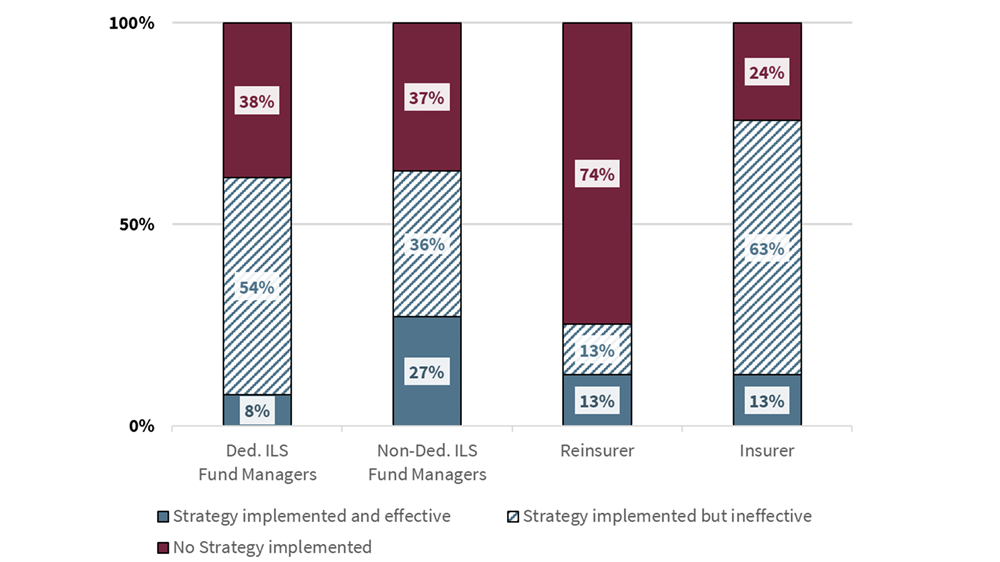In August and September 2020, Synpulse joined forces with leading ILS news provider Artemis to conduct a survey to find out how companies in the risk transfer market incorporate environmental, social, and governance (ESG) factors into their strategies and operations. It’s the first ESG survey in the risk transfer market of its kind. In this article, the first of a series accompanying the publication of the market study, we take a brief look at how ESG is perceived and practiced in terms of organisations’ strategies, cultures, and principles and ask whether there is still a gap between perceived importance and practice.
Our survey indicates ESG has huge strategic relevance for companies in the risk transfer market. ESG is a major consideration for 80% of the businesses polled, 95% believe that ESG will be more important for their organisation in the future, and 95% agree that an integrated ESG strategy will be crucial to succeed in the future. Considering the momentum ESG currently has in the risk transfer market, these are incredible figures.
What is driving ESG?
Why has ESG become such an important factor? The following graphic shows the main drivers of ESG in the risk transfer market:

Investor desire (or customer demand) is particularly important from a fund manager’s and investor’s perspective. Reputation and risk management, on the other hand, are important drivers across the whole risk transfer market. Again, this indicates the extent to which ESG has become rooted in the minds of the entire market, from (re)insurers to institutional investors and other stakeholders. No matter where companies are positioned along the risk transfer value chain, leaders of today and the future cannot neglect its relevance.
How does the market reflect on ESG?
So we are agreed: ESG is perceived as being hugely important by companies in the risk transfer market, and there’s clear information available on what is driving this perception. But how do companies see themselves in ESG terms?
We asked those surveyed whether they agreed with two statements:
1. My business fulfils a social and/or environmental purpose.
2. My company is ahead of its competitors regarding ESG.
An overwhelming 95% agreed with statement 1. But what about statement 2? Here it really gets intriguing, with fund managers more likely to see themselves ahead of the competition in ESG terms than (re)insurers. The findings range from only 25% among reinsurers to a whole 82% among non-dedicated ILS fund managers. Taken in conjunction with other survey findings, we believe this indicates overconfidence on the part of fund managers. This might originate from the notion that ILS is widely considered to be inherently ESG-friendly. But what about investing in coal-fired power plant protection by way of insurance, for example? Can this really be considered environmental and/or social?
Perception is one thing but how does it look in practice?
How are companies proceeding in terms of ESG strategy implementation:

Most companies in the risk transfer market, except for reinsurers, have already implemented an ESG strategy. So far, so good. The problem is, however, that the percentages of companies that have an implemented strategy they would describe as effective is very low, ranging from only 8% to 27% depending on the peer group. This means, in fact, that the majority of implemented strategies are considered ineffective and still require work.
The survey shows that there is plenty of room for improvement in terms of implementing ESG frameworks more thoroughly and sustainably, defining tangible KPIs and measurable goals, and enabling target-oriented external and internal reporting.
Conclusion: Catch-up potential
The findings of our survey are exciting and sobering in equal measure. An effective ESG strategy is going to be crucial to succeed in the risk transfer market in the future – but most companies have considerable catching-up to do. So stay tuned: there will be more on this in our next article on ESG within processes and operations.
These were only the bare bones of our survey findings and interpretations. To find out more, sign up to receive a download of the market study when it appears (around mid-December) or contact us directly.
